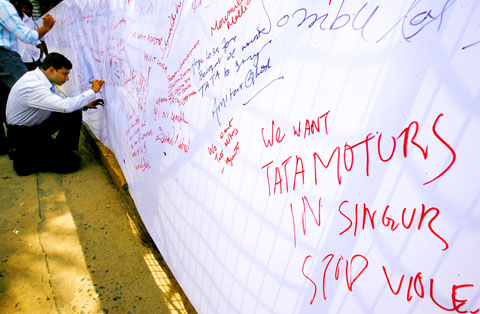India’s giant Tata Motors sought new sites yesterday to make the world’s cheapest car after suspending work on its plant in eastern India in the face of huge farmer and political protests.
A Tata statement announcing the suspension late on Tuesday fell short of declaring the company was pulling out of West Bengal for good.
But it would be “highly optimistic to think of a return to normalcy at the Singur site in the next few days — nothing has happened in the past few months,” a senior company official said.

PHOTO: AFP
Tata was “leaving the window of opportunity open” for peace to be restored at the nearly complete plant but “we have no choice” except to look for other locations, said the official, who asked for anonymity.
“We have a business to run, deadlines to meet,” he said.
Tata hoped to start selling the snub-nosed car next month for just 100,000 rupees (US$2,264).
But analysts said the launch of the car, billed as the world’s cheapest, would be delayed by months if the assembly line were moved to Tata’s factories in Pune in Maharasthra state or Patnagar in Uttarakhand State.
The plant outside the state capital Kolkata, in which Tata has invested US$350 million, has been shut since last Friday.
The company said that it was unsafe for staff to report for work after they were “violently obstructed.”
Protests against the plant have been going on for two years with activists saying poor farmers were evicted to make way for the plant. But rallies escalated in the past 10 days with demonstrators besieging the plant.
Ratan Tata, chairman of the sprawling Tata Group, who conceived the project as a way to get India’s masses off motorbikes and into safer cars, warned last month he would move the plant “whatever the cost, to protect our people.”
Since then, Tata has been flooded by offers from other Indian states vying to host the site of a new plant.
The announcement on Tuesday shocked the business community, which said it would hurt India’s image as an emerging economic superpower and viable investment destination.
Investor confidence “would be completely shattered as the land was legitimately allotted to the Tatas,” said Venu Srinivasan, chairman of leading Indian two-wheel seller TVS Motor Co.

MORE VISITORS: The Tourism Administration said that it is seeing positive prospects in its efforts to expand the tourism market in North America and Europe Taiwan has been ranked as the cheapest place in the world to travel to this year, based on a list recommended by NerdWallet. The San Francisco-based personal finance company said that Taiwan topped the list of 16 nations it chose for budget travelers because US tourists do not need visas and travelers can easily have a good meal for less than US$10. A bus ride in Taipei costs just under US$0.50, while subway rides start at US$0.60, the firm said, adding that public transportation in Taiwan is easy to navigate. The firm also called Taiwan a “food lover’s paradise,” citing inexpensive breakfast stalls

TRADE: A mandatory declaration of origin for manufactured goods bound for the US is to take effect on May 7 to block China from exploiting Taiwan’s trade channels All products manufactured in Taiwan and exported to the US must include a signed declaration of origin starting on May 7, the Bureau of Foreign Trade announced yesterday. US President Donald Trump on April 2 imposed a 32 percent tariff on imports from Taiwan, but one week later announced a 90-day pause on its implementation. However, a universal 10 percent tariff was immediately applied to most imports from around the world. On April 12, the Trump administration further exempted computers, smartphones and semiconductors from the new tariffs. In response, President William Lai’s (賴清德) administration has introduced a series of countermeasures to support affected

CROSS-STRAIT: The vast majority of Taiwanese support maintaining the ‘status quo,’ while concern is rising about Beijing’s influence operations More than eight out of 10 Taiwanese reject Beijing’s “one country, two systems” framework for cross-strait relations, according to a survey released by the Mainland Affairs Council (MAC) on Thursday. The MAC’s latest quarterly survey found that 84.4 percent of respondents opposed Beijing’s “one country, two systems” formula for handling cross-strait relations — a figure consistent with past polling. Over the past three years, opposition to the framework has remained high, ranging from a low of 83.6 percent in April 2023 to a peak of 89.6 percent in April last year. In the most recent poll, 82.5 percent also rejected China’s

PLUGGING HOLES: The amendments would bring the legislation in line with systems found in other countries such as Japan and the US, Legislator Chen Kuan-ting said Democratic Progressive Party (DPP) Legislator Chen Kuan-ting (陳冠廷) has proposed amending national security legislation amid a spate of espionage cases. Potential gaps in security vetting procedures for personnel with access to sensitive information prompted him to propose the amendments, which would introduce changes to Article 14 of the Classified National Security Information Protection Act (國家機密保護法), Chen said yesterday. The proposal, which aims to enhance interagency vetting procedures and reduce the risk of classified information leaks, would establish a comprehensive security clearance system in Taiwan, he said. The amendment would require character and loyalty checks for civil servants and intelligence personnel prior to